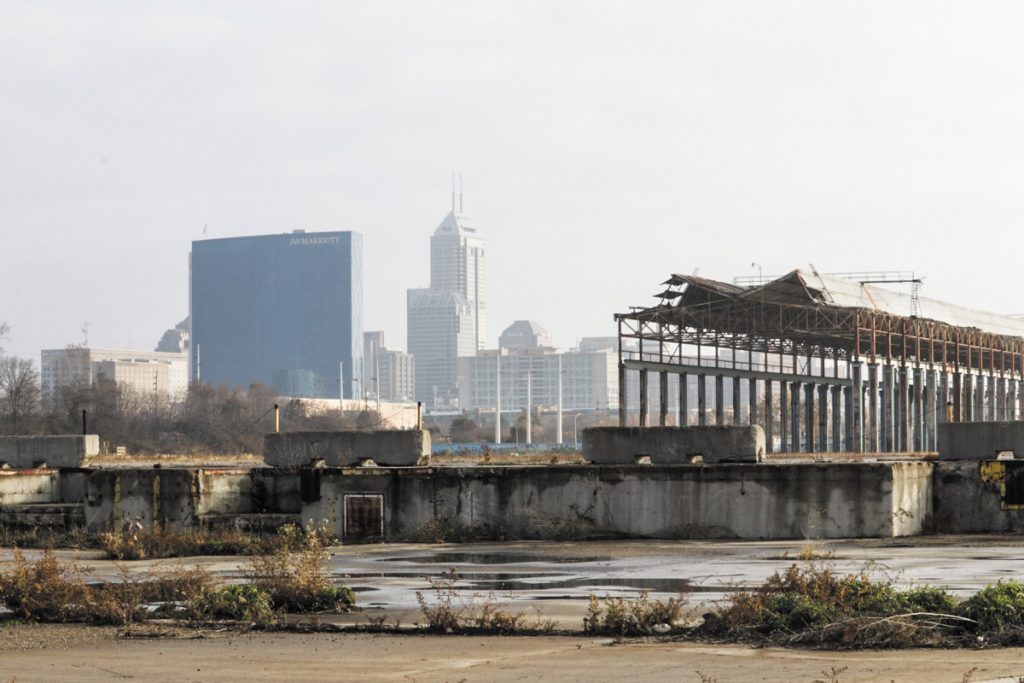Subscriber Benefit
As a subscriber you can listen to articles at work, in the car, or while you work out. Subscribe NowThe city of Indianapolis was told Wednesday by a judge that it can’t begin eminent domain proceedings on the former GM stamping plant site until its ongoing legal dispute with development firm Ambrose Property Group has been resolved.
Judge Tim Oakes of Marion Superior Civil Court 2 ordered the city to temporarily abstain from legal maneuvers to take over the property following a 40-minute, closed-door meeting between city and Ambrose.
A formal order laying out ground rules for upcoming legal proceedings is expected to be issued later this week.
The meeting was part of an initial hearing in Ambrose’s lawsuit against the city, filed Nov. 19 after weeks of public sparring over the future of the 91-acre downtown site.
The suit contends the city does not have the right to claim eminent domain over the property because of a clause in the parties’ 2018 project agreement—a claim experts told IBJ is on solid legal ground.
Ambrose withdrew from its $1.4 billion development project at the stamping plant site, known as Waterside, in late September, setting off a public battle with the city over control of the site. The city had been working closely with the Indianapolis-based firm for more than two years before the company left the project.
Daniel Lombard, an attorney with Chicago-based firm Quinn Emanuel, which is representing Ambrose, said after the hearing that the firm was pleased with the discussions.
“It sets a path for moving the case forward, which we are happy with,” he said.
The judicial order, which affirms an injunction request made by Ambrose, keeps the city from filing for eminent domain in court—a case that would be separate from the ongoing court battle.
But the order does not prevent the city from moving toward eminent domain altogether, meaning the city could continue to receive appraisals of the property as required by law in such cases.
A source told IBJ the city is working with at least two independent appraisers on the site, but said the process is expected to take several months.
The city said in a Dec. 2 filing it had no intention of going after the site until the current dispute is resolved.
“[T]he City has communicated to Ambrose’s counsel that it will agree not to initiate a condemnation action while Ambrose’s claims in this Complaint are pending,” the filing said. “This permits the Court to proceed expeditiously to the merits of the dispute and resolve them fully for the benefit of both parties.”
In addition to the order, attorneys for the city and Ambrose charted a course for the early stages of the case—including key filing dates for both parties.
According to a docket entry posted Wednesday afternoon, the schedule for the case will run through at least January 2020. A formal order for the case has not yet been filed.
The city is required to file any motion to dismiss the case by Dec. 26, with a response due from Ambrose by Jan. 15, 2020. The city would need to reply to any response within a week, and a hearing on the motion is expected to occur Jan. 31.
Additionally, Oakes set a deadline of Jan. 6 for attorneys from both parties to prepare items for discovery, which will be limited in scope. The city had objected to any type of discovery in the case, indicating it did not believe discovery of any kind was “necessary nor appropriate.”
The city’s position followed a Nov. 22 filing by Ambrose, which asked the court for an expedited discovery period beginning Nov. 29, which would allow each party to conduct up to five interrogatories—written interviews—within seven days of the request.
The request also allowed each party to make up to 10 requests for documents (provided within 21 days) and to seek third-party documents, all limited to non-privileged matters related to the case. The request included a provision allowing for five in-person depositions by each party, on or before Jan. 18.
In a written statement, Ambrose said it would “let the order speak for itself.”
“We look forward to advancing this process so that the property can be developed quickly, to the benefit of both the local community and Indianapolis as a whole,” the company’s statement said.
A spokesperson for the mayor’s office declined to comment.
Please enable JavaScript to view this content.


Absolutely the correct call. Hopefully this debacle forces the City to rethink how it does deals and to approach them with a heightened sense of caution, tact and urgency. But this is Indy. PS, end TIFstitution.